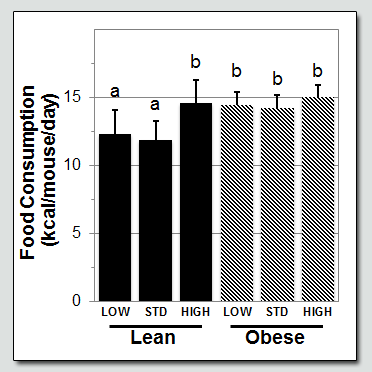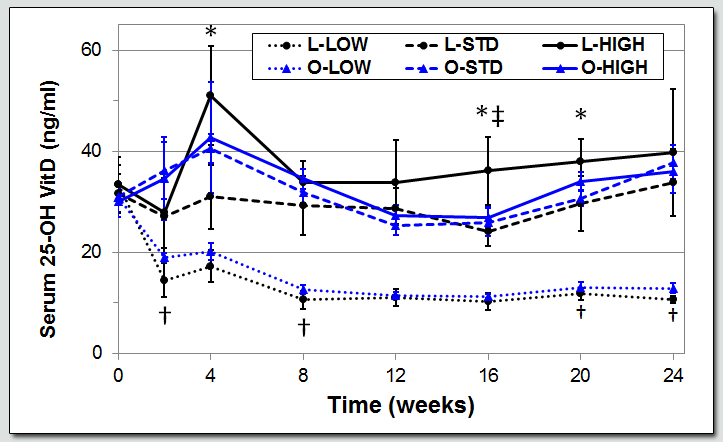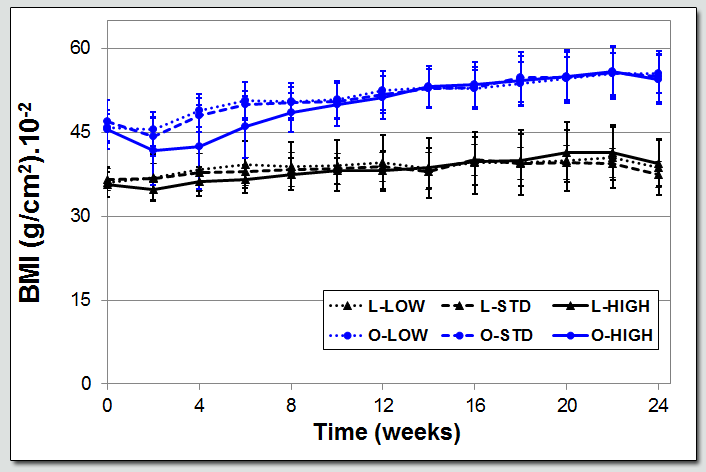
![]()
In this Ph.D. edition, Scientific AmeriKen is proud to discuss, "A mouse model of vitamin D insufficiency: is there a relationship between 25(OH) vitamin D levels and obesity?", work that was recently published in the peer reviewed journal, Nutrition and Metabolism - Click here to view the actual study. This study revolves around vitamin D, aka - "the sunshine vitamin", which has seen a resurgence in popularity in recent years as being important for health beyond just bones. A major concern is that as many as 50-70% worldwide may be vitamin D deficient (having a serum 25-OH vitamin D level below 10 ng/ml (or 25 nmol/L) or insufficient (< 30 ng/ml (or 75 nmol/L)). Additionally, as many as 35% in the United States is obese - and obese individuals are more likely to have low vitamin D - raising the possibility that the two phenomenon are linked. The purpose of this study is to determine if low vitamin D contributes to obesity, or vice-versa, if obesity causes low vitamin D.
![]()
Serum vitamin D levels have been linked to obesity in multiple studies (Link 1, Link 2, Link 3). Based on this it was the hypothesis of this experiment that if we make mice have low vitamin D then they will gain weight faster!
![]()
This experiment was performed in mice since humans can be very complex! There are many lifestyle and genetic differences between humans that can make it difficult to determine if vitamin D is doing anything at all, in fact some mutations will make a serum vitamin D level that is considered low in one person be completely fine in another! On the other hand, genetically identical mice can be used and provided the exact same lifestyle - thus allowing a better examination of what happens when vitamin D, and only vitamin D levels change. In this experiment mice were either given a standard diet, or a high fat diet for 4 months - then the vitamin D supplementation was changed such that mice then received either high, standard, or low amounts for another 6 months. Vitamin D levels, body weight, and food consumptions were all monitored closely.
![]()
After 4 months of either low or high fat chow the 25-OH vitamin D levels of the mice were taken, chow was changed to high, standard, or low amounts of vitamin D, and then routine measurements of vitamin D levels continued (Figure 1)
Figure 1. Vitamin D levels in mice - serum vitamin D measurements were taken using enzyme linked immunosorbant assay (ELISA). (L) means lean mice and (O) means obese mice given high, standard, or low amounts of vitamin D in their chow. A (*) indicates a significant difference between high and low chow, a dagger represents a difference between lean and obese mice.
At the 0 time point both lean and obese mice were being given standard amounts of vitamin D and showed no differences in their vitamin D levels. This suggests obesity does not affect vitamin D levels. Figure 1 also shows the vitamin D levels in the low mice drop very rapidly - all the way to near deficiency (about 12 ng/ml), whether mice were lean or obese! Strangely the high supplementation (about double) did not seem to boost vitamin D levels in either lean or obese mice. During this time we also followed the body mass index of the mice (mouse weight divided by the mouse length squared, Figure 2).
Figure 2. Mouse body mass index.
Surprisingly despite having high or low supplementation over the 6 month period the mice maintained similar body weight! To confirm if the mice were eating the same amount of food, we also looked at average daily food consumption (Figure 3).
 |
Figure 3. Food consumption in mice - food was weighed weekly and the difference taken as the food consumed during that time. Two different letters indicate significant differences between the two groups (that is, a group with an "A" above it consumes more or less food than a group with a "B" above it). |
Our data indicate that even though the high supplemented lean mice had similar weight gain to either standard or low supplemented mice, they still consumed more food over the course of the experiment! This trend also appears in the obese mice, but it is uncertain if this difference exist or it is due to random happenstance.
![]()
In this experiment we set out to determine if low vitamin D causes greater weight gain or if obesity causes low vitamin D levels. Our data seem to indicate that neither seems to be happening! This raises the question of what do all these human studies mean that have found links between vitamin D and obesity? Although it is difficult to say, it could be simply due to lifestyle differences - perhaps lean people are outside more and get more sunlight and thus vitamin D, or perhaps it takes more vitamin D in an obese person to attain the same serum level? In this study the obese mice were given an adjusted amount of vitamin D to ensure both were getting the same amount (since obese mice eat less) - this may not be the case in people and obese individuals may simply not be getting enough. Although all signs of this study point towards vitamin D not mattering for body weight, one interesting result is that the lean mice getting more vitamin D ate more food without gaining weight! If true vitamin D may be our best friend - however, Scientific AmeriKen will wait for this to be studied further before topping the next ice cream sundae with vitamin D pills!
Click here to view the actual study and for further discussion of this experiment please visit http://www.sciencechatforum.com today!
Note: This animal study was in accordance with the Miami VA, VA western new york, and University at Buffalo institutional animal care and use committees (IACUC) to ensure that proper procedures were in place to provide optimal care and well being for the mice during this study.

